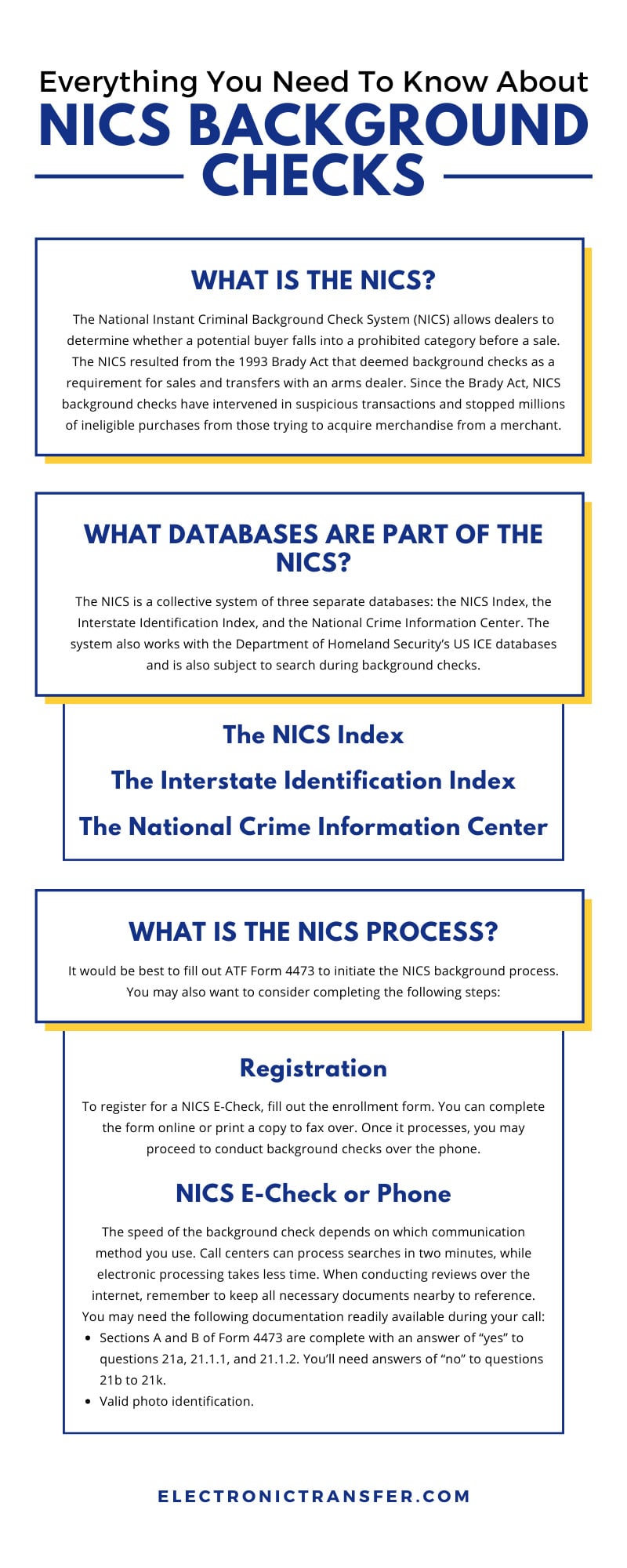Everything You Need To Know About NICS Background Checks
Paul Baptist | Posted on |


Thorough NICS reporting tries to improve sales with arms dealers and keep merchandise out of the hands of violent individuals. Here is everything you need to know about NICS background checks and their process.
What Is the NICS?
The National Instant Criminal Background Check System (NICS) allows dealers to determine whether a potential buyer falls into a prohibited category before a sale. The NICS resulted from the 1993 Brady Act that deemed background checks as a requirement for sales and transfers with an arms dealer.
Since the Brady Act, NICS background checks have intervened in suspicious transactions and stopped millions of ineligible purchases from those trying to acquire merchandise from a merchant.
What Databases Are Part of the NICS?
The NICS is a collective system of three separate databases: the NICS Index, the Interstate Identification Index, and the National Crime Information Center. The system also works with the Department of Homeland Security’s US ICE databases and is also subject to search during background checks.
The NICS Index
The NICS Index is the central catchall database that doesn’t fall into NCIC or III requirements. Law enforcement typically maintains the index for merchandise background checks.
For instance, mental health documentation and state-prohibiting records are part of the NICS. They provide users with information to determine whether they’re ineligible to buy merchandise from a merchant.
Furthermore, federal law also prohibits those who don’t have citizenship in the US from possessing merchandise through an arms dealer. Given this detail, a NICS check will include scouting the US ICE database for matches.
The Interstate Identification Index
The III is a catalog of information about those with a criminal record. The crimes can list from all felonies to some misdemeanors. Employers, licensing agencies, and law enforcement are among the parties that use this tool to search for criminal backgrounds.
Situations resulting in trespassing or loitering misdemeanors are minor crimes and are not part of the III.
The National Crime Information Center
Dating back to 1967, the NCIC continues to be a helpful database for law enforcement to learn information about people and properties. Well-known examples of its usage are during vehicle stops. A police officer would typically use the NCIC when wanting to know if the occupant of the vehicle has a warrant for their arrest or if they stole the car.
The NCIC may also contain records of domestic dispute orders, fugitive files, and missing person reports, among other documents. Due to the sensitivity of these records, some may result in arms prohibitions. During a NICS check, the system will analyze the NCIC for matches on a prohibiting record.
Who Does the NICS Service?
The NICS aims to serve and protect the general population and merchants. The system protects dealers from conducting questionable business with prohibited individuals and risking the welfare of others.
The NICS provides full service to FFLs in 31 states, five US territories, and the District of Columbia, and it offers partial service to six states. The remaining thirteen states must conduct their checks and searches through the system.
What Is the NICS Process?
It would be best to fill out ATF Form 4473 to initiate the NICS background process. You may also want to consider completing the following steps:
Registration
To register for a NICS E-Check, fill out the enrollment form. You can complete the form online or print a copy to fax over. Once it processes, you may proceed to conduct background checks over the phone.
NICS E-Check or Phone
The speed of the background check depends on which communication method you use. Call centers can process searches in two minutes, while electronic processing takes less time. When conducting reviews over the internet, remember to keep all necessary documents nearby to reference.
You may need the following documentation readily available during your call:
- Sections A and B of Form 4473 are complete with an answer of “yes” to questions 21a, 21.1.1, and 21.1.2. You’ll need answers of “no” to questions 21b to 21k.
- Valid photo identification.
What Records Are Subject to Search?
While Connecticut and Florida require a corresponding agency to inquire about local and state records, other states require more focused searches of NICS and criminal information.
Other documents are subject to search, including the following.
Mental Health Files
Individuals with an outstanding mental health record can not engage in sales with dealers under federal law. Different states have specific compliance standards to maintain when regarding mental health documentation.
For example, California, Connecticut, Illinois, and New York are among the seven states that require searching for in-state mental health records. New Jersey is among the three states requiring the buyer to authorize mental health record examinations.
The state of Washington requires a signed application to do business with a dealer, constituting a waiver of confidentiality and formal request. The request should include a motion to release all relevant mental health information to a court or law enforcement agency.
Juvenile Court
As stated previously, many states prohibit purchases or merchandise possession by those with convictions or criminal records. States like Pennsylvania, Wisconsin, and Utah require extensive searches of juvenile files as part of the background check.
Colorado may authorize the disclosure of juvenile delinquency information, while other states include criminal history and juvenile documentation under the same category.
Protective Order and Warrant Information
Federal law and some state legislation may prevent individuals with a protective order or who have a warrant from purchasing arms from a dealer. States like Wisconsin and Massachusetts may require background checks at the transaction or before issuing an arms license, respectively.
What Are Points of Contact?
States where local authorities can initiate background checks classify as “point of contact” or “POC” states. Searches are more thorough in POC states, given access to independent databases and search engines in the NICS.
What Are Procedure Laws for the POC States?
Procedure laws for background checks in POC states require buyers to complete a sale transfer application form, present a photo ID, and pay fees. The dealer sends the application to a state agency.
Learning everything about NICS background checks establishes expectations when handling an arms sale with a buyer. With an FFL merchant account, consider Electronic Transfer as your best help. We enjoy doing business with FFL dealers and can provide you with the ideal credit card processor for your business.



